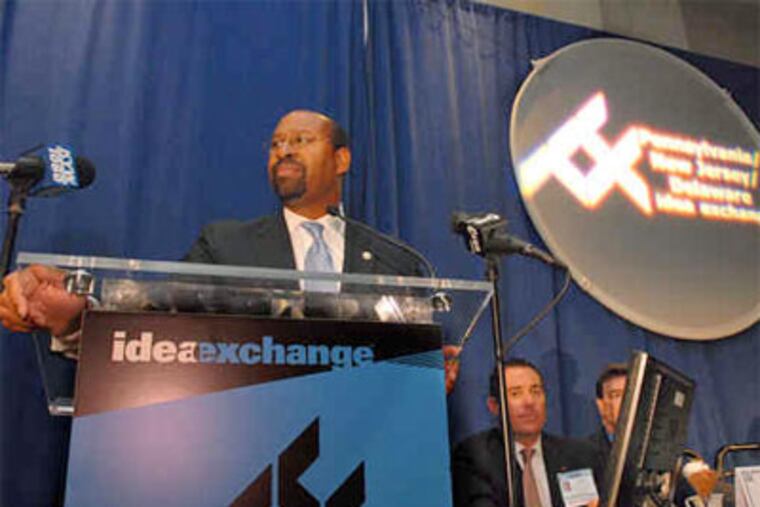Center City now looks to hook retail
Center City has come a long way since 1992, when Philadelphia was teetering on the verge of bankruptcy: Now, there's a downtown convention center, posh hotels, gleaming new office towers, coveted condo addresses (with the accompanying residents), and a restaurant scene with a major cool factor.

Center City has come a long way since 1992, when Philadelphia was teetering on the verge of bankruptcy: Now, there's a downtown convention center, posh hotels, gleaming new office towers, coveted condo addresses (with the accompanying residents), and a restaurant scene with a major cool factor.
Now, if only it could get a little more - how to put it? - King of Prussia in the shopping department.
Eyeing what has been an elusive goal for the otherwise burgeoning downtown district, local leaders yesterday launched an initiative to market Center City aggressively as a place retailers can no longer afford to overlook.
The Philadelphia Retail Marketing Alliance, led by the Center City District, introduced a plan whose cornerstone is a new Web site, http://philadelphiaretail.com, that includes a database of vacant retail property, the names of corresponding brokers, and information about government incentives available for development.
Backers of the new initiative, in the works since March 2008, hope it gives retail the same kind of urgency that helped tourism, culture, and the culinary world turn Center City into a must-go destination over the last two decades.
"Philadelphia, in many ways, has changed its reputation on the hospitality side, certainly on the residential side, but there hasn't been an organized effort to change its image nationally on the retail side," said Paul R. Levy, president and chief executive officer of the Center City District.
CCD took the wraps off the initiative at the Convention Center yesterday, at the annual two-day regional gathering sponsored by the International Council of Shopping Centers.
"Philadelphia is open for business, and we are ready for you," Mayor Nutter told about 300 real estate lawyers, developers, investors, and retailers.
"Everyone knows that we've been going through the toughest economic time quite possibly since the Great Depression," Nutter said. It's a particularly difficult time for Philadelphia, the mayor added, as it tries to avert "devastating action" while mired in a state budget deadlock that has choked off much-needed revenue.
And yet, Nutter said, Center City's housing market remains strong and continues to grow, two new hotels will soon open, and the Convention Center will be twice its current size once an expansion is completed in 2011.
Still, it may take more than a snappy sales pitch to change the way retailers view Center City.
Levy said national retailers had an "outdated image" of Center City and failed to recognize the population density and high-income customer base it has developed in recent years.
But retail experts and retailers see real obstacles that do not exist in the suburbs, where retail expansion reached unprecedented heights before the lending markets crashed. Parking is scarce and expensive, asking rents are high, and storefront ownership is fractious, with many landlords to contend with.
By Levy's count, there are 2,500 to 3,000 separate owners of retail parcels in Center City.
Roy Perez-Daple, senior real estate manager in charge of selecting new sites in the region for the Lowe's Cos. Inc. home-improvement chain, said that downtown Philadelphia was an attractive market, but that the economics were not yet ideal.
A landlord may own 10 shops totaling 100,000 square feet, he said. That owner can collect $75 per square foot, per shop, and make a lot of money, rather than offering the entire space at the lower prices retailers such as Lowe's pay in the suburbs.
"I'm not going to pay that," Perez-Daple said. Lowe's has opened three stores on large tracts in the city: on the Delaware River, at Center City's edge; in West Philadelphia; and in Northeast Philadelphia, with a fourth location coming to Port Richmond, also along the river.
Agreeing with his analysis was retail broker Steven H. Gartner, president of Metro Commercial Real Estate Inc. and regional director of the shopping center trade group holding its annual deal-making summit this week.
"You get a lot more money selling pieces of bread instead of a loaf," Gartner said, "and he's a loaf."
Plus, Philadelphia has a 7 percent sales tax, soon to be 8 percent when the budget impasse ends, which has made it less competitive with the suburbs, said Jonathan D. Miniman, vice president and senior analyst for ING Clarion Real Estate Securities L.P., of Wayne.
"The economics have to work for the retailer," said Miniman, who analyzes the retail market. He added that parking hassles in Center City, where shoppers notoriously fret about being ticketed or towed or paying hefty fees for lots, are also concerns for retailers.
Center City boosters, however, said the economics were increasingly in retailers' favor.
A report issued by CCD says 66 percent of the 54,096 people living in the immediate Center City area (Vine Street to Pine Street, the Delaware River to the Schuylkill) have bachelor's degrees and average household incomes of $74,317.
Expand that area to Tasker Avenue and Girard Avenue, the report says, and there are 159,325 people with average household incomes of $63,547, while 45 percent of residents have bachelor's degrees.
Those demographics have created huge demand for restaurants, but not for other retail ventures.
The number of restaurants and take-out stores increased 4 percent over the last year and 29 percent since 2005. Yet there was a small drop in apparel, shoe, and accessory stores last year, despite the arrivals of Juicy Couture, True Religion Brand Jeans, and other high-end stores.
Prominent Walnut and Chestnut Streets have high-profile vacancies and landlords so far unwilling to reduce rents. But Levy said overall vacancies were up only a half-percentage point, further evidence that Center City has staying power.